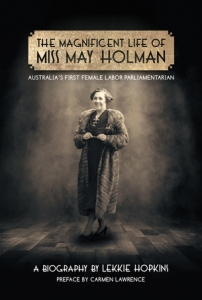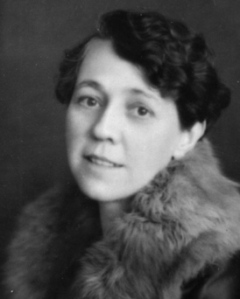Ok, put your Feminist History hats on…
#SternAdmonition: No, no peeking at Google!
What is May Holman famous for?
(Or rather, what should she be famous for, because she’s not.)
#Hint: 1893-1939, Western Australia
Still can’t guess?
#Big hint: Think Edith Cowan (1861-1932)
Give up? I’m not surprised… I didn’t know either till I read this book. I’d never heard of her. But now that I’ve read The Magnificent Life of Miss May Holman, by Lekkie Hopkins, I’m here to tell you that:
May Holman was
- the first female Labor parliamentarian elected anywhere in Australia;
- the first female parliamentarian in Australia to be re-elected to her seat, serving five terms and 14 years in the WA parliament altogether, and re-elected for a sixth term on the eve of her death;
- the only woman, in 1935, to have served a decade in parliament not just in Australia but in the entire British Empire;
- an Australian delegate at the League of Nations in Geneva in 1930; and
- a woman whose untimely death inspired an astonishing outpouring of grief across Australia, earning a heartfelt eulogy from Prime Minister John Curtin.
 Prediction: I will not be the only reviewer to use the phrase ‘this long overdue biography’ …
Prediction: I will not be the only reviewer to use the phrase ‘this long overdue biography’ …
Maybe May Holman lapsed into obscurity because of the difficulties in writing her biography: there are some tantalising gaps in the documentary record. Former WA parliamentarian Dr Judyth Watson made a start back on a bio back in the 1990s but the task as completed by Lekkie Hopkins shows that some of the most intriguing aspects of May Holman’s life remain a mystery. Did she, or did she not meet the author Katharine Susannah Prichard, who lived and worked in WA in the same era and who published a novel about the same issue that most keenly interested Holman? Because Prichard published Working Bullocks in 1926, and because after her father’s death Holman took his seat in parliament representing timber workers, Hopkins thinks they must have had shared left-wing sympathies and thus this bio has three pages of conjectured conversation between them.
But why would such a connection remain unrecorded in letters or diaries or anywhere else? Hopkins makes a cogent argument that Prichard’s membership of the Communist Party would have meant political death for May Holman if a friendship between them became public knowledge. May Holman’s father had successfully sued for libel when it was implied that he had Communist sympathies, because it was clear to the court that that advocating the overthrow of Parliamentary Government was by implication a self-evident horror. Unlike Edith Cowan whose platform was independent feminism (and whose parliamentary career lasted only three years in part because she was isolated within the House), May Holman’s agenda was broader and her long parliamentary career and achievements were supported by the Labor Party to which she was staunchly loyal. So any association with Communists would have been a Bad Look indeed…
There’s also a mysterious underage secret marriage which drove May’s father John Barkell Holman MLA into a violent rage at her 21st birthday party. Hopkins does her best to fossick out the truth of this, but at the end of the day we don’t know much more than that the possibly disreputable husband Joseph Peter Gardiner scarpered, never to be seen again, and May petitioned to divorce him for desertion five years later. The court documents make a point of saying that May always was a girl of unblemished character (which is code for early 20th century prudery, meaning that she was a virgin). And she never remarried. No hint of a lover, or even a potential male friendship. Only her devotion to her father, and a possibly obsessive relationship with her siblings, because she took an unreasonably dim view of it when they got married and broke up the family.
There’s a veil drawn over May Holman’s mother too. Katherine Mary Rowe married young, when May was ‘on the way’, and managed to be active in the Labor Party as well as bear ten children. But it was May who was given guardianship of her little brothers and sisters when her father died, and Katherine appears to have become an alcoholic, and challenged her husband’s stingy Will before disappearing off to New Zealand, never to return.
Enough of all that – what did May Holman do to earn the plaudits of the entire nation? Well, because she had worked as her father’s secretary before he died, she knew the ins and outs of the timber industry better than anybody, and she fought tirelessly to improve their pay and conditions. It was she who steered the passage of the Timber Industry Regulation Bill in 1926, researching and framing it to international admiration. (The ILO in Geneva requested a copy, and so did several American university libraries and legislatures around the world.) But she was not a single-issue politician.
The issues she spoke on throughout her career were usually connected either with workers’ rights and conditions, or were relevant to the wellbeing of women and children. While her support for the broader suite of Labor ideals was never in doubt, what quickly became clear to her colleagues and to the local media was her intense interest in tracing the impact of parliamentary decisions on the lived experiences of ordinary folk. She saw education as a way out of grinding poverty and powerlessness for the working classes; she saw child rearing as a crucially important activity, and maternal health as central to a satisfying family life; she was aware of the benefits of a good diet and a healthy outdoor physical lifestyle; she understood the need for decent living conditions, good health services, and adequate housing. She knew the dignity of work; and she knew the experience of being valued for her capacities rather than being diminished or limited by her gender. (p.122)
Her party was in government for eleven of the fourteen years she was in parliament, so she made an art form of congratulating the government on its achievements while tacking a demand onto the end of her speech. A school here, a hospital there, abolition of an unfair impost on trainee nurses, an increase in child endowment, summer uniforms for the police, and so on. During the Depression when in Opposition, she was a stout advocate for unemployment benefits and work opportunities:
…Miss Holman sought justice for people on sustenance relief in the timber country, pointing out how devastating it was for people who had to prove total destitution before qualifying for sustenance relief. She cited case after case where the regulations discriminate in nonsensical ways: she told of the beekeeper who had been refused sustenance payments because he still had hives that might earn him an income; the young nurse who could receive no sustenance relief because she had a parent in part-time work; the families who had to wait till their few pounds in the bank were spent before seeking sustenance. (p. 182).
You can see in the excerpt above that the author sometimes lapses into clunky prose, and sometimes her disappointment that May Holman was not more of a feminist leads the narrative astray. There are rather too many stodgy slabs of quotations from documents, and there’s a bit of repetition in content and phrasing that could usefully have been tidied up by an editor. Hopkins is not a gifted biographer like Brenda Niall or Jill Roe, but she has less material to work with than most and she has succeeded in bringing her most remarkable subject to life.
A timeline of events would have been a useful addition to this book, but there are endnotes and an index, and there are plenty of B&W photos to enliven the text.
Update 27/12/15
The Australian Legend has reviewed this book too, and amongst other thoughts in his most interesting review, he quotes Nathan Hobby from A Biographer in Perth, and I reproduce it here because it’s exactly how I feel about biography:
“The best biographies, in my opinion, are generally written by biographers who care about biography as a genre rather than biographers who are simply passionate about their subject. The demands of the genre are just too great; a good biography requires someone who has thought through its challenges and conventions. Particularly in Australian biography, there are a lot of biographies written by those who are not biographers (perhaps academics, perhaps enthusiasts) and with less concern for what makes not just for accuracy or comprehensiveness, but for a well-told story.”
Nathan is a PhD student writing a bio of Katherine Susannah Prichard and I am very much looking forward to reading it when it eventually hits the bookstands!
Author: Lekkie Hopkins
Title: The Magnificent Life of Miss May Holman, Australia’s First Female Labor Parliamentarian
Publisher: Fremantle Press, 2015
ISBN: 9781925163353
Review copy courtesy of Fremantle Press
Availability
Available from January 2016 at Fremantle Press or Fishpond: The Magnificent Life of Miss May Holman



‘long overdue’ yes, sadly herstory rarely appreciated by history. Thanks again for your excellent insight and summary, Lisa.
LikeLiked by 1 person
By: mairineilcreative writer on December 5, 2015
at 10:06 am
Mairi, you would be the one person I know who would have known about May Holman!
LikeLiked by 1 person
By: Lisa Hill on December 5, 2015
at 10:10 am
I’ve heard of her, and not only because I live near May Holman Drive :-)
LikeLike
By: amandacurtin on December 5, 2015
at 1:40 pm
Well done, Amanda! I can’t tell you how pleased this makes me:)
LikeLiked by 1 person
By: Lisa Hill on December 5, 2015
at 1:47 pm
She certainly is an inspiration! But it seemed her father must have wielded an iron hand on May’s life (and possibly her mother’s) for her not to seek matrimony ever again in her life; he certainly had much influence on her life. :-)
LikeLike
By: readinpleasure on December 11, 2015
at 3:48 am
Yes, the author says, again and again, that she adored him. He was certainly a larger-than-life figure.
LikeLike
By: Lisa Hill on December 11, 2015
at 10:44 am
[…] See also the review by Lisa at ANZ Lit Lovers (here) […]
LikeLike
By: May Holman | theaustralianlegend on December 27, 2015
at 2:56 pm
[…] Bill and Lisa have written helpful reviews of a new biography, The Magnificent Life of Miss May Holman, […]
LikeLike
By: May Holman | A Biographer in Perth on January 1, 2016
at 12:15 pm